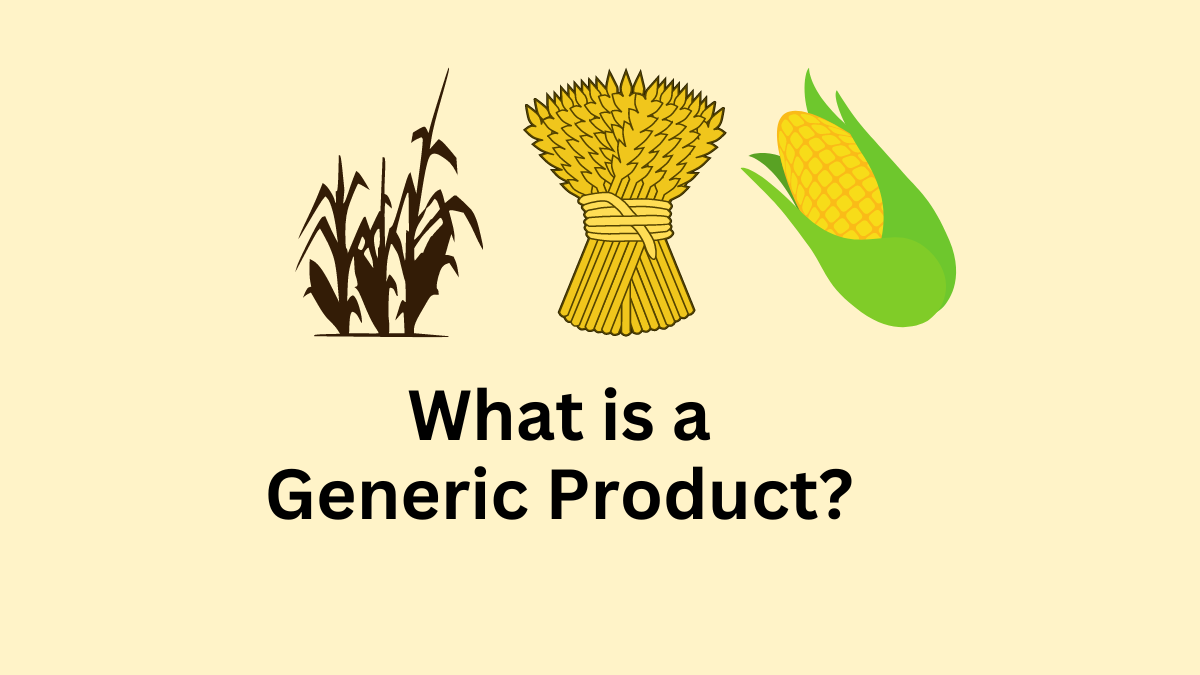What is a Generic Product?
A generic product is like the plain version of something you buy, especially at a grocery store. Imagine going shopping with your parents, and you come across the cereal aisle. There are loads of cereals in colorful boxes with famous brand names. But there’s also cereal in simple bags or boxes with no fancy logos – those are the generic ones.
These generic products don’t care about having a cool brand name. Instead, they’re all about what’s inside. So, if you’re looking for something specific, like cornflakes, you can find them in the generic section without any famous brand attached.
Generic products can be made by smaller companies or even the same big ones that make famous brands. They’re usually cheaper because you’re not paying for a fancy name. Sometimes they look like popular brands with colorful packaging, but they’re all about what’s inside. So, if you’re looking to save money, generic products are often a smart choice.
Characteristics of Generic Product
Generic products are something that you find in stores that do not have any brand names. The key features of generic products include the following:
Read More: Business Buying Behavior – Definition
- No Fancy Brand Names: Generic products don’t have those famous logos you see on TV. Instead of saying “Nike” or “Coca-Cola,” they just say what they are, like “sneakers” or “cola.”
- Affordable Prices: Generic products are usually cheaper than the ones with big brand names. That’s because you’re not paying for fancy ads or famous names.
- Same Quality Inside: Even though they don’t have famous names, generic products are often just as good as fancy ones. It’s like finding a plain-looking book that’s just as exciting to read as one with a colorful cover.
- Different Packaging: While they might not look fancy on the outside, some generic products now have colorful packages that try to look like the famous ones. But remember, it’s what’s inside that counts.
The Five Levels of Product
The generic product is one of the products from the five levels of product. It comes after the core product. Let’s shortly look at them.
Read More: Core Product – Definition
- Core Benefit: This is the cake’s delicious taste. It’s the fundamental thing customers want. For a phone, it’s communication.
- Generic Product: Think of this as the cake’s basic ingredients, like flour and sugar. It’s what makes the core benefit possible, like a phone’s hardware.
- Expected Product: These are the standard toppings on your cake, like icing. Customers anticipate them, like a phone having a touch screen.
- Augmented Product: These are the extra goodies on the cake, such as sprinkles or filling. They make your product stand out, like a phone offering a free case.
- Potential Product: This is the cake’s future potential. Maybe one day it’ll have even fancier toppings or flavors. Similarly, a phone might get new features
Read More: What is Buyer Behavior?
Importance of Generic Product
Let’s explore the importance of generic products including how they are integral to successful marketing.
Cost-Effective Choices
Generic products are like budget-friendly superheroes. They empower consumers to make smart spending decisions. Just as a thrifty shopper appreciates a good sale, opting for generics lets customers save money. For businesses, marketing these products as wallet-friendly options can attract cost-conscious consumers.
Inclusive Accessibility
These types of products are like open invitations to a party. They make quality goods accessible to everyone, regardless of their budget. Similar to a welcoming host, businesses can market generics as products that cater to a broad audience, fostering inclusivity.
Read More: Market Research – Definition
Versatile Variety
Generic products are a treasure trove of choices. They offer an array of options, allowing consumers to find products that suit their unique preferences. For marketers, highlighting this diverse range in promotions can attract consumers seeking variety.
Quality Without Frills
These products are like skilled artisans who focus on delivering top-notch quality without lavish luxuries. They provide value without the need for flashy packaging or extravagant advertising. This quality-focused approach in marketing can resonate with discerning customers who prioritize substance over style.
Consumer Trust
Over time, generic products have gained the trust of consumers. Just as a trustworthy friend’s recommendation carries weight, generic products are viewed as reliable options. Effective marketing can build on this trust factor by highlighting consistent quality and affordability.
Read More: PESTLE Analysis – Definition
Examples of Generic Products
Here are four examples of generic products we can find in our normal everyday life.
Store-Brand Cereals
Imagine store-brand cereals as friendly neighbors in the cereal aisle. They come in plain and simple packaging, without flashy characters. These cereals offer the same great taste and nutrition as big-name brands but with a more budget-friendly price tag.
Generic Pain Relievers
Think of generic pain relievers as trusty sidekicks when you have a headache or muscle pain. They contain the same active ingredients as their brand-name counterparts but without fancy logos. These cost-effective alternatives provide relief without hurting your wallet.
Supermarket Bottled Water
Picture supermarket bottled water as your reliable drinking buddy. It may not have a famous mountain on the label, but it quenches your thirst just the same. These generic bottled waters offer pure hydration without the premium price.
No-Name Cleaning Products
Consider no-name cleaning products as the unsung heroes of cleanliness. They lack celebrity endorsements, but they tackle dirt and grime with enthusiasm. These generic cleaners help you maintain a sparkling home without overspending.
Read Next: Marketing Environment – Definition
Arti Kushmi holds a BBS (Bachelor in Business Studies) degree and shares her business and marketing knowledge through this website. While not writing she will be reading and enjoying the moment.
